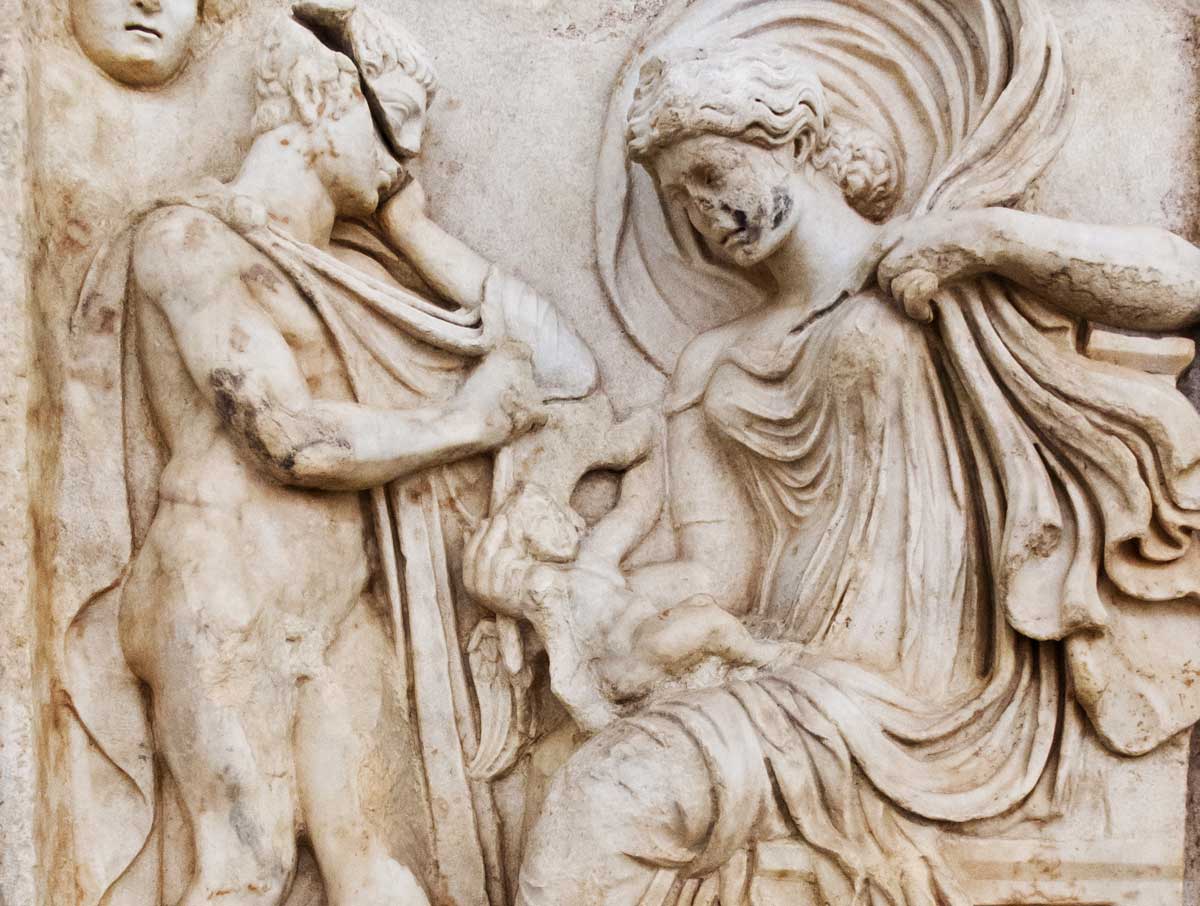Feature
There Is Forgiveness
But There Are No Shortcuts on the Road to Reconciliation
When she was a teenager, Gina Trimble became the Reverend Raymond Kownacki’s housekeeper after he told her parents that he would help her get a better education. He educated her—in what it felt like to be raped. She got pregnant, and he induced an abortion by hand. She passed out and later delivered a dead fetus.
She left him and told her parents. They visited Bishop Albert Zuroweste of Belleville, Illinois, who, according to court records, “took no notes and showed little interest in Gina or her claims.” After they left his office, the Reverend Dean J. Braun, Kownacki’s successor at the parish, who had accompanied the Trimbles, told them that “Bishop Zuroweste would not discipline Father Kownacki and that Gina must forgive Father Kownacki and forget his physical and sexual abuse of her.” To accomplish this, Braun performed a ceremony unknown to the Roman Rite: “He placed a ritualistic vestment on his shoulders, anointed Gina with oil, prayed over her in Latin, and while anointing her with oil, told her she must give up her anger and that she must forgive Father Kownacki and forget what he had done to her or her soul would die.”
This is an extreme but representative example of the misunderstanding and misuse of forgiveness. The demand that victims forgive their abusers is used to avoid the hard work of repentance and restitution. In Forgiveness and Abuse: Jewish and Christian Reflections, editors Marie M. Fortune and Joretta L. Marshall write, “The demand to forgive so that everyone will feel better, or the desire to minimize conflict in relationships, encourages ‘forgiveness’ that is too quick and, ultimately not redemptive.”
Catholic and Protestant leaders find this misunderstanding of forgiveness a useful tool. In an essay in Forgiveness and Abuse, Peter Horsfield notes that
Church leaders often use forgiveness as a tool for settling abuse situations as quickly and easily as possible to avoid scandal, conflict, and disruption to institutional programs, to spare them from having to confront or oppose a powerful and threatening person, to avoid possible legal action, and to avoid having to face up to injustice and abuse in churches’ own structures.
This desire to avoid conflict is strengthened by the predominantly female membership of the churches. Women have a stronger tendency than men to maintain relationships at any cost: They keep the family together, not only in hard times, but even in cases of incest. They are frequently victims of abuse in churches, but are also the ones who do not want the abuse confronted lest it tear the church apart.
Stages of Forgiveness
Forgiveness has many stages. First of all, like any human act, it must be in accord with reality. Actions that are based on a false perception of reality are not good actions. The injured party must react in accord with reality. He must be angry at the real evil that has been done to him. The reality of the sin and injustice must be recognized, not only in words, but also in deeds.
We speak of someone being in a false situation; the thief who verbally confesses his sin but refuses to return the money is living in a false situation. The offender must recognize the truth of his position in regard to the person he has offended. Then the offender must act on that position, by a repentance that includes acknowledging his offense to all those hurt by it, by the acceptance of deserved punishment, and by the will to make restitution.
Even though the injured party may have been desirous at all times of forgiving the offender, it is only at this point that forgiveness can occur. As L. Gregory Jones explains in his book Embodying Forgiveness: A Theological Study, “The purpose of forgiveness is the restoration of communion, the reconciliation of brokenness.” Forgiveness ends in the renewal of a relationship. This renewal cannot occur without the repentance of the offender.
This is the structure of Christian forgiveness. Misunderstandings of forgiveness are based upon a misperception of what Christian charity is. God is love, Deus caritas est. But what type of love is charity? According to Thomas Aquinas, charity is friendship. Even if the universe were never created, God is love because he is trinitarian. The love within the Trinity is a love of friendship. God is also love in relation to his creatures. He offers this friendship to them, but friendship by its nature is reciprocal. A person can offer friendship, but friendship does not exist until the person to whom it is offered responds and offers friendship in return.
Christian charity therefore must be distinguished from benevolence (modern “unconditional love”), which is wishing well to someone, desiring his good. Friendship includes benevolence, but it goes beyond benevolence in that (among other things) it is reciprocal. We can wish well to someone who does not wish well to us; we cannot be friends with someone who refuses to be our friend.
God therefore wills the good of all that he has created. He also offers the special gift of friendship to the rational creature he has created, man. Man, however, can refuse this gift of friendship by committing sin. To return to friendship, the sinner must repent. It is a logical impossibility, a self-contradiction, for God to restore the friendship without repentance. This repentance (itself a gift of God) effects a real change in the sinner, and he can receive the forgiveness offered him by God for the sake of the Passion of Christ and thereby restore the relationship of friendship. The forgiveness of sins therefore has a double cause; both must be present or forgiveness cannot exist: the Passion and repentance.
Repentance Required
Jesus, like many rabbis, stressed the centrality and importance of forgiveness both between God and man and between man and man. When we sin against God and we repent, he forgives us. Forgiveness is so important to Judaism, notes Rabbi Mark Dratch in an essay in Forgiveness and Abuse, that it teaches that forgiveness “is one of the seven things created even before the world was created.” But sin comes not simply between man and God, but also between man and man. God can forgive sin insofar as it offends him, but the one who is sinned against has to be the one to forgive the offense against him.
The Mishnah, Dratch explains, teaches that “for transgressions between humans and the Omnipotent the Day of Atonement procures atonement, but for transgressions between one person and another, the Day of Atonement does not procure any atonement, until [the perpetrator] has appeased the victim.” Jesus referred to this teaching when he said, “If you are offering your gift at the altar, and there remember that your brother has something against you, leave your gift there before the altar and go; first be reconciled to your brother, and then come and offer your gift” (Matt. 5:23).
We are told to forgive as God has forgiven us. God in turn forgives us as we forgive others. We should forgive others when they repent of their sin against us. We love our enemies because they are God’s creatures, and we therefore wish their good, which is that they repent of their sin and are restored to relationship with us, but we cannot forgive them and restore the relationship of charity (which is friendship) until they reciprocate. Paul asks Christians to be God’s chosen ones, “forgiving each other; as the Lord has forgiven you, so you also must forgive” (Col. 3:13).
But God does not and cannot forgive without the repentance of the sinner. Similarly, we cannot forgive without the repentance of the one who has injured us. We can desire his good, which in this context is that he repent; we can be willing and eager to forgive, but we cannot forgive until the offender repents. “If your brother sins, rebuke him, and if he repents, forgive him; and if he sins against you seven times in the day, and turns to you seven times, and says, ‘I repent,’ you must forgive him” (Luke 17:4).
For the offending party (or anyone else) to ask for forgiveness of an offense without repentance is the sin of presumption. In fact, it is worse than presumption, because it is asking a mere mortal to do something that is unbecoming to God. It is the “cheap grace” that Dietrich Bonhoeffer denounced the Church for preaching—forgiveness without repentance.
The Nominalistic Error
Underlying this misunderstanding of forgiveness are nominalistic presuppositions. God is seen as declaring that a sinner is just, without making any real changes in him. Our only duty is to submit to God’s will, which in this case is to regard the person who is in reality a sinner as just and therefore saved. Forgiveness occurs without repentance, without a real change in the heart of the sinner. The sinner may then change as a response to this declaration, or he may not; he is still forgiven.
Whether this represents the true Protestant position or a distortion of it is a matter of controversy between Catholics and Protestants. In any case, Catholics have adopted much the same attitude: A parishioner of the abusive priest Michael Allen told a journalist for the Evansville Courier & Press that he was a little shocked when Allen confessed, but decided that “he really is a good priest.” The parishioner went on:
When this first came out, he [Allen] admitted to it and everyone was just in shock—this is not the guy we know. But I think Catholics have been taught to go to confession, say they’re sorry for their sins, be forgiven and life goes on. I think he’s been punished enough.
(There was no punishment apart from the exposure.)
“Saying you’re sorry” is only part of repentance. Allen never even did that to his victim David Prunty, who pointed out that “he never apologized to me. He only apologized publicly when he was cornered.” True repentance includes an acknowledgment in word and deed of the truth of the situation. To be truly repentant, the offender must not only acknowledge the truth of the situation, but also accept any punishment due him and will to make all the restitution that is possible.
The criminal crucified with Jesus told the criminal who mocked Jesus, “We indeed have been condemned justly, for we are getting what we deserve for our deeds” (Luke 23:41). His repentance allowed Jesus to tell him, “Truly I tell you, today you will be with me in Paradise” (Luke 23:43). When Jesus announced that he would go to the house of the extortioner Zacchaeus, Zacchaeus received the gracious offer of forgiveness and repented: “Behold, Lord, the half of my goods I give to the poor; and if I have defrauded anyone of anything, I restore it fourfold” (Luke 19:9). His repentance allowed Jesus to announce, “Today salvation has come to this house, since he also is a son of Abraham. For the Son of Man came to seek and to save the lost” (Luke 19:9–10).
Two Kinds of Harm
Any deliberate injury hurts us in two ways: the specific harm done by the injury, and the contempt that the offender shows us by injuring us. This contempt is often more painful to bear than the injury itself. When a person does us an injury, he tells us: I am somebody, you are nobody; I am important, you are unimportant. This power differential has been noted in sexual abuse, but it is true of all cases of sin involving the injury of another.
The attitude of the offender is false: all persons are of infinite worth, and no one can use another person as a mere tool to achieve his end, whether it be sexual pleasure (abuse) or money (robbery). By hurting the victim, the offender has in fact become the victim’s debtor and is below the victim. The victim is the creditor and the offender is the debtor in the commercial metaphor frequently used in the Bible.
The offender must acknowledge the truth of this situation and seek to receive the forgiveness of this debt from the victim. Forgiveness flows down from God to the one who had sinned against him, and from the human victim downward to the one who has offended him.
The offender must recognize that his offense has given the victim power over him; the positions are reversed. The offender, who regarded the victim as less important than himself, must now recognize that he is less important than the victim; he must humble himself before the victim and ask for forgiveness. This repentance, if sincere, must include a willingness to suffer punishment and a will to make restitution. A victim can then forgive the offender.
Responding to Christ
People sincerely repent, often in response to Christ’s Passion. Karin Bøhm-Pedersen reported in the Norwegian newspaper Aftenposten that a criminal named
Olsen, one of Norway’s most feared men, walked into the offices of Dagbladet [newspaper] and confessed to two bombings of Oslo’s Blitz House, a self-styled “counterculture center” that is a gathering spot for young left-wing radicals. Olsen turned himself in to police late Saturday and claimed he would provide them with details that would prove he was responsible for the bombings. Olsen said that he had decided to confess after watching The Passion of the Christ.
Nor was Olsen the only one. Bøhm-Pedersen also noted that “a Texas man recently confessed to murder and a Florida thief turned himself in after watching Gibson’s film of the final hours of Christ’s life.”
The Need for Discernment
In regard to sexual abuse by a priest, the easiest error about forgiveness to confute is the confusion of forgiveness with restoration to office. No one has a right to a pastoral office, especially to the priesthood, as the Catholic Church tirelessly tells women. The ministry in all churches is fundamentally based upon God’s call, discerned by the person called and ratified by the authorities of the community. No one has a right to be ordained. The suitability of the candidate for ordination must be discerned by the authorities, and this discernment must continue as long as the minister is holding office.
Few abusers have shown anything like true repentance. Since many of them are confidence artists, even protestations of sorrow must be carefully scrutinized to see whether they are sincere or manipulative. No clerical abuser has, to my knowledge, ever turned himself in to the police; only a handful approached their bishops before they were accused.
Forgiving a repentant abuser who has injured us is hard enough. How can he ever make restitution for such a serious injury? Rabbi Dratch writes:
Even if physical scars can be healed, and that is not always possible, how can one erase the memories and horrors that afflict victims years and lifetimes after they have been attacked? Perhaps that is the true mystery of repentance and forgiveness, when it is properly earned. Perhaps that is why sincere repentance is so difficult to accomplish and forgiveness is so difficult to achieve.
An Act of Grace
The logical connection between forgiveness and repentance cannot be broken. But must repentance precede the offer of forgiveness? Sometimes yes, but a common human and Christian instinct is to offer forgiveness to an offender who has been brought so low by outward circumstances, has been so humiliated, that he has “suffered enough.” The victim feels that the outward circumstances now manifest the inward reality: The offender has been brought low, and can do no more evil. Then as a sheer act of grace, the victim, without denying the reality of the situation, can offer forgiveness. The victim, who has suffered a contemptuous injury, is manifestly not the one who is of lesser value, and can now offer forgiveness from a position of superiority. He can, without being asked, cancel the debt. It still, of course, must be received for forgiveness to achieve its purpose of reconciliation.
A 2002 article in the Boston Globe tells the story of Thomas Blanchette, who said he was molested hundreds of times by the late Reverend Joseph E. Birmingham. As Birmingham lay dying, Blanchette sought him out. “I began with a litany of names I knew in Sudbury [Massachusetts] that he abused. . . . With a sense of genuine righteousness, I told him that what you did to us, and to me specifically, was wrong and that you had no right to do that.”
Then Blanchette asked Birmingham to forgive him for the hatred and resentment that he held against the priest for nearly thirty years; he said Birmingham then dissolved into tears.
Five Rs of Forgiveness
The process of forgiveness is described by an Australian abuse victim in four Rs:
1. Recognition of the sin. Without recognition of sin by the sinner,
there is no forgiveness.
2. Repentance of the sin. Without repentance by the sinner, and
a firm intention to change, there is no forgiveness.
3. Recompense for
the sin. In other words: payment, or punishment. Whatever word you use, there
is clear evidence that God’s forgiveness
is dependent on someone paying the price for sin before forgiveness is possible.
4. Restitution for
the sin. Sinners in the Bible who recognized their sin tried to restore the
situation to a “pre-sin” state (e.g.,
Zacchaeus paying back four times what he stole). This was the action that authenticated
their claim of repentance.
To these I would add a fifth R that explains the purpose of the others: Reconciliation of the sinner. Having fulfilled the first four stages, the abuser ceases to be an abuser: He becomes a new man, no longer an enemy, but a friend. The sinner cannot do this of his own power, but God will not, and indeed cannot, do it without the sinner’s participation. •
Leon J. Podles holds a Ph.D. in English from the University of Virginia, has worked as a teacher and a federal investigator, and is president of the Crossland Foundation. He is the author of The Church Impotent (Spence), Sacrilege (Crossland Press), and Losing the Good Portion: Why Men Are Alienated from Christianity (St. Augustine Press). Dr. Podles and his wife have six children and live in Baltimore, Maryland. He is a senior editor of Touchstone.
subscription options
Order
Print/Online Subscription

Get six issues (one year) of Touchstone PLUS full online access including pdf downloads for only $39.95. That's only $3.34 per month!
Order
Online Only
Subscription

Get a one-year full-access subscription to the Touchstone online archives for only $19.95. That's only $1.66 per month!
bulk subscriptions
Order Touchstone subscriptions in bulk and save $10 per sub! Each subscription includes 6 issues of Touchstone plus full online access to touchstonemag.com—including archives, videos, and pdf downloads of recent issues for only $29.95 each! Great for churches or study groups.
Transactions will be processed on a secure server.
more from the online archives
calling all readers
Please Donate
"There are magazines worth reading but few worth saving . . . Touchstone is just such a magazine."
—Alice von Hildebrand
"Here we do not concede one square millimeter of territory to falsehood, folly, contemporary sentimentality, or fashion. We speak the truth, and let God be our judge. . . . Touchstone is the one committedly Christian conservative journal."
—Anthony Esolen, Touchstone senior editor









